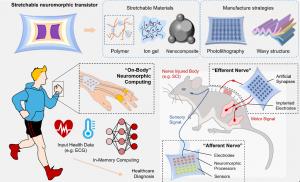Manufacturing strategies for stretchable synaptic transistors
GA, UNITED STATES, October 30, 2025 /EINPresswire.com/ -- Researchers at Seoul National University have compiled the latest technologies in the field of fabricating stretchable synaptic transistors, a neuromorphic device capable of learning even under deformation. This review introduces materials, manufacturing processes (photopatterning, printing, lamination-and-transfer), and structures (vertical, wave-like, textile) that maintain low-voltage stable operation even under deformation. By clearly identifying remaining technical challenges, such as n-type/bipolar semiconductors, CMOS-compatible patterning, and biocompatibility, it provides a roadmap for developing scalable wearable and neuroprosthetic systems.
A research team from Seoul National University has established a manufacturing “blueprint” for stretchable synaptic transistors. The mini review(doi:https://doi.org/10.1016/j.wees.2025.07.001 ) consolidates how materials selection, process flow, and device architecture jointly determine electro-mechanical stability and learning accuracy of soft electronics.
“What’s new here is the process-centric, comprehensive approach,” said first author Tingyu Long. “By comparing photopatterning, printing, and lamination-and-transfer processes across substrates, electrodes, semiconductors, and ion-conducting dielectrics, we show how to maintain stable electrical behavior of devices at low voltage even under ≥50–100% tensile strain.”
The key conclusion is that architecture matters. Vertical organic (electrochemical) transistors shorten transport paths and decouple in-plane cracking from current flow, outperforming purely planar channels under deformation. Complementary wavy/corrugated mechanics and textile-type systems dissipate strain or distribute it across fiber networks, supporting repeatable synaptic plasticity during mechanical deformation.
“These insights move soft neuromorphic hardware toward scalable, CMOS-compatible integration,” added co-first author Chunghee Kim. “Bridging microfabrication with intrinsically stretchable materials is needed for reliable, large-area arrays for on-skin wearable electronics and bio-interactive prosthetics.”
The review also presents immediate applications; on-body AI that filters ECG-like biosignals; nociceptive e-skin for safer human–robot interaction; and artificial afferent/efferent nerves that translate sensory inputs into motor actuation with ultralow energy consumption while matching with tissue softness.
At the same time, the authors identified unresolved several challenges. Priority targets include n-type and ambipolar stretchable semiconductors with preserved mixed conduction of ions and electrons; photo-crosslinkable and printable systems beyond polymer channels (e.g., electrolytes, small-molecule semiconductors); interfacial insulation for vertical stacking without thermal damage; and biocompatible, self-healing, self-powered platforms for long-term implantation.
DOI
10.1016/j.wees.2025.07.001
Original Source URL
https://doi.org/10.1016/j.wees.2025.07.001
Funding information
This work was supported by the National Research Foundation of Korea (NRF) grants funded by Korea government (MSIT) (RS-2022-NR067540, RS-2024-00416938). T.L. thanks for the support from the China Scholarship Council (Grant no. 202006890033).
Lucy Wang
BioDesign Research
email us here
Legal Disclaimer:
EIN Presswire provides this news content "as is" without warranty of any kind. We do not accept any responsibility or liability for the accuracy, content, images, videos, licenses, completeness, legality, or reliability of the information contained in this article. If you have any complaints or copyright issues related to this article, kindly contact the author above.

